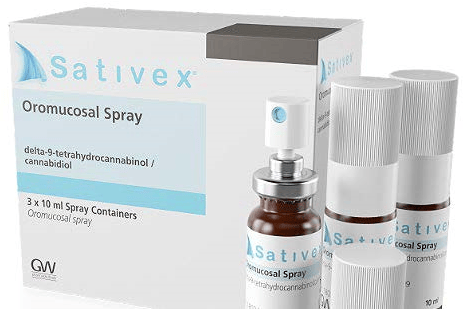
News Highlights 🗂️:
CBD's Potential in Treating MS: CBD 🍐 may help alleviate MS-related symptoms such as pain, inflammation 🏮, spasticity, fatigue, and depression by interacting with the body's endocannabinoid system 🧮. Verywell Health
Efficacy of Cannabis-Based Medicines 💦: Cannabis-based products, including those containing CBD and tetrahydrocannabinol (THC 🟢), have shown potential in improving quality of life for MS patients 🤟🏽. Multiple Sclerosis Society
CBD's Role 💚 in Mobility Improvement: CBD might improve mobility in people 💃 with MS by reducing spasticity and pain, thereby enhancing movement and physical function 🖖🏿. PMC

Quick Read 📗:
🧠 Neuroinflammatory Regulation Potential: CBD 🟩 exhibits anti-inflammatory and neuroprotective effects by modulating the endocannabinoid system.
🧠 Preclinical Promise vs. Clinical Ambiguity: While animal models demonstrate CBD’s efficacy in reducing neurodegeneration and oxidative stress, human clinical trials 👨🏻💻 remain limited, inconsistent in methodology, and inconclusive in outcomes.
🧠 Sativex as a Regulatory Benchmark: The THC-CBD spray ❄️ Sativex, approved internationally for MS-related spasticity, provides indirect validation of cannabinoid-based therapies—yet pure CBD ✳️ formulations require further substantiation.
🧠 Mechanistic Complexity and Biochemical Precision: CBD’s action ❤️🔥 on TRPV1, PPAR-γ, and anandamide signaling illustrates a multifaceted neurochemical mechanism potentially beneficial for MS, though the full pharmacodynamic map 🗺 is incomplete.
🧠 Accessibility Challenges and Consumer Risk: Due to regulatory inconsistencies, product variability, and lack of standardized dosages 🌡, patients navigating the unregulated CBD market face risks in efficacy, safety 🚧, and legal status.

CBD 🍁 for Multiple Sclerosis: What the Studies 📚 Suggest
Once relegated to the dusty corners 📐 of pseudoscience and cannabis culture, cannabidiol (CBD) has emerged 🧫 as a serious contender in modern therapeutic discourse. Nowhere is this more evident than in its proposed role in managing Multiple Sclerosis (MS)—a chronic, often disabling ♿️ neurological disorder with symptoms that frequently defy straightforward treatment. As scholars, clinicians, and patients coalesce around cannabinoid research, one question percolates 🍵 to the surface: Can CBD offer legitimate relief for those battling the complexities of MS?
Let’s embark on a forensic excavation 🔍 of the data, distilling truth from trend, hype from hypothesis.
Cannabis-based medicines, including those containing CBD, have been approved for use in treating muscle spasms in multiple sclerosis."
The Enemy Within 💔
MS is an autoimmune disorder in which the immune system erroneously attacks 🔪 the protective myelin sheath surrounding nerve fibers. This demyelination disrupts communication 🔌 between the brain and the rest of the body, giving rise to a constellation of symptoms including muscle spasms, chronic pain, fatigue 💤, and impaired coordination.
The disease ☢️ progresses in unpredictable phases—relapsing, remitting, or advancing steadily. Conventional treatments such as corticosteroids, interferons, and monoclonal antibodies attempt to slow 🐌 progression and mitigate flare-ups. However, these therapies often come with adverse effects 💫 or only marginal efficacy, leading patients and researchers to explore adjunctive therapies, including plant-derived 🍏 cannabinoids.
CBD: The Non-Psychoactive Neuromodulator 📡
Unlike THC 🐲, its euphoric cousin, CBD does not induce intoxication. Instead, it interacts subtly with the endocannabinoid system (ECS)—a network 🕸 of receptors, enzymes, and neurotransmitters distributed throughout the central nervous system and peripheral organs. The ECS plays a pivotal role in maintaining homeostasis 📏, modulating inflammation 📛, pain, and immune response.
In the context of MS, CBD’s anti-inflammatory 💧 and neuroprotective properties are of particular interest. The question remains whether those properties can translate from the lab bench 🧪 to the bedside.

Rodent Hopes vs. Human Realities 🐭
Preclinical studies 🗃 have painted an optimistic picture. In rodent models of MS, CBD has demonstrated the ability to reduce neuroinflammation, protect 🔰 neurons from oxidative stress, and even improve motor function. These findings suggest a potential for CBD as both a palliative 🛌 and disease-modifying agent.
However, rodent 🐭 models—though essential—are notoriously fickle predictors of human response. The leap 👣 from furry quadrupeds to upright hominids requires rigorous clinical validation, preferably double-blind, placebo-controlled, and peer-reviewed. In other words, we need less wishful thinking 🧞 and more statistical significance.
Clinical Trials: Data in the Wild 📊
The clinical landscape 🖼 is still in its embryonic stage, but growing. A pivotal study published in Frontiers in Neurology (2018) examined the impact of CBD-rich 🦠 cannabis extracts on MS-related symptoms. Patients reported statistically significant improvements in spasticity, sleep quality 🛏️, and pain—areas where traditional pharmacotherapy often falls short.
Yet the trials conducted so far vary wildly in methodology: different dosages 🍶, varying THC-to-CBD ratios, inconsistent formulations (oils, capsules, sprays 🗣), and diverse endpoints. This heterogeneity makes it difficult to draw 📝 definitive conclusions 🧾. Meta-analyses call for more standardized protocols before embracing CBD as a gold-standard 💛 MS therapy.

Sativex: The One Legal Outlier 🚪
Interestingly, one pharmaceutical 🏥 formulation—Sativex, a THC-CBD oromucosal spray—has been approved in over 2️⃣5️⃣ countries for treating MS-related spasticity. Though not purely CBD 🎄, Sativex lends indirect support to the cannabinoid family’s efficacy in symptom management. That approval has catalyzed broader interest 🧲 in isolating CBD’s unique contributions, especially in regions where THC remains legally or culturally contentious.
Mechanisms of Action 🤼♂️: CBD’s Complex Ballet 💃🏿
How exactly does CBD 🍡 exert its effects on MS pathology? While the full picture is elusive, some mechanisms are emerging. CBD 🧃 appears to reduce microglial activation (a hallmark of neuroinflammation), modulate calcium homeostasis ☯️, and inhibit excitotoxicity via interaction with non-cannabinoid receptors 🔸 like TRPV1 and PPAR-γ.
Moreover, CBD’s 🐛 indirect enhancement of anandamide—the so-called “bliss molecule”—might contribute to mood stabilization, pain modulation, and even neurogenesis. But we’re still navigating a biochemical maze, and the finish line 🏁 is far from clear.

Patient Perspectives: The Living Laboratory 🧍
Qualitative 👑 studies and patient surveys reveal compelling anecdotes. Many MS sufferers report that CBD offers tangible relief with fewer side effects compared to prescription medications 💊. Improved mobility, reduced spasticity, enhanced sleep, and better emotional regulation 🤬 are commonly cited outcomes.
But let us not mistake anecdote for algorithm 🔢. The placebo effect can be deceptively powerful, particularly in conditions with a fluctuating baseline 📉. This doesn’t invalidate the lived experience—it merely underscores 🕳 the need for controlled study.
Legal 👨🏻⚖️ and Logistical Hurdles
Despite CBD’s ♻️ growing popularity, access remains patchy. Regulatory confusion, product variability, and supply-chain 🔗 inconsistency make reliable use difficult for many MS patients. The unregulated market is a veritable roulette wheel 🌀 of efficacy, where labeling often bears 🐻 only a tangential relationship to content.
Efforts by the FDA 🏛 and international regulatory bodies to impose quality standards and labeling protocols are underway—but they move at a bureaucratic glacial ☃️ pace. Until then, consumers are left to parse a jungle of tinctures, vapes, balms, and gummies 🧁 with variable potency and purity.

Proceed With Evidence, Not Enthusiasm 🤨
So, where does that leave us⁉️
CBD 🌾 is not a panacea, but neither is it snake oil. It occupies a liminal space—between potential and proof, excitement and evidence. For MS sufferers 👴🏼 desperate for alternatives, CBD may offer a modest but meaningful reprieve 🛶. But it must be integrated thoughtfully, in collaboration with healthcare providers 🚑 and guided by evolving clinical standards.
As research accelerates ☄️ and public interest intensifies, one hopes that CBD will shift from supplement aisle spectacle 🛣 to evidence-based intervention. Until then, let’s temper our expectations with intellectual rigor and a critical eye.
Could CBD 🌿 become a cornerstone in the evolving treatment architecture for Multiple Sclerosis ♿️, or is it destined to remain an ancillary player in the pharmaceutical symphony 🎻?
☄️ Chase Knowledge 📩

The information provided in this newsletter is for informational purposes only and does not constitute medical, legal, or professional advice. Always consult with a qualified professional before making any decisions based on the content shared here.

